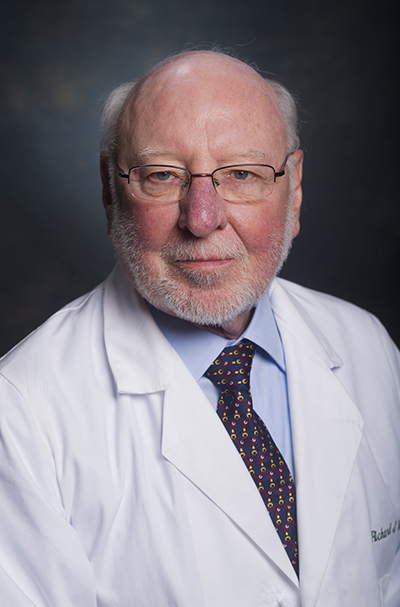Editor's Note: The information published in this story is accurate at the time of publication. Always refer to uab.edu/uabunited for UAB's current guidelines and recommendations relating to COVID-19.
 Richard Whitley, M.D., Distinguished Professor at UAB and principal investigator of the U19 grantThe investigational drug remdesivir, developed through research conducted through the Antiviral Drug Discovery and Development Center, or AD3C, and centered at the University of Alabama at Birmingham, is being used to treat select infected patients in the United States and in China who have been affected by the outbreak of novel coronavirus (2019-nCoV).
Richard Whitley, M.D., Distinguished Professor at UAB and principal investigator of the U19 grantThe investigational drug remdesivir, developed through research conducted through the Antiviral Drug Discovery and Development Center, or AD3C, and centered at the University of Alabama at Birmingham, is being used to treat select infected patients in the United States and in China who have been affected by the outbreak of novel coronavirus (2019-nCoV).
UAB was awarded a $37.5 million, five-year U19 grant from the National Institute of Allergy and Infectious Diseases Centers of Excellence for Translational Research to study and develop treatment for high-priority emerging infections. Work has been taking place in earnest to develop drugs for emerging influenza, flaviviruses (dengue, West Nile virus and Zika), coronaviruses that cause SARS and MERS, and alphaviruses such as Venezuelan equine encephalitis virus and chikungunya. The grant is a multi-institutional collaboration to accelerate drug discovery for these emerging infections and is a public-private partnership between academic institutions and Gilead Sciences.
Remdesivir, developed to treat the coronavirus causing MERS, was found to have significant activity against the 2019-nCoV strain when the outbreak began in the Chinese city of Wuhan. Importantly, remdesivir had demonstrated efficacy in treating other medically important coronaviruses MERS and SARS in cell culture and animal models. Based on the compassionate plea requests of treating physicians in the United States, Gilead Sciences released remdesivir for use in a few patients, although the drug has not yet been tested for safety or efficacy in these diseases. “The release of remdesivir for safety and efficacy studies is a major accomplishment for the AD3C – namely the U19 grant – as it shows significant and swift advance of antiviral drugs to help treat and respond to emerging infectious disease outbreaks on an international scale and, importantly, to anticipate the introduction of these infections in the United States,” said Richard Whitley, M.D., Distinguished Professor at UAB and principal investigator of the U19 grant.
WATCH: UAB infectious disease experts provide information on the 2019 novel coronavirus.
Gilead Sciences and supporting researchers and clinicians are working with health authorities from the World Health Organization and in China to establish a placebo-controlled study to determine whether remdesivir is safe and effective in treating 2019-nCoV.
| “This is a prime example of how the research we are conducting at UAB plays a critical role in treating patients on a global scale and our contribution of substantial scientific advances.” – Richard Whitley, M.D., UAB Distinguished Professor |
“The collaboration between UAB, our colleagues at Southern Research, Vanderbilt University and the University of North Carolina, along with our pharmaceutical partner Gilead Sciences, is indicative of our collaborative approach to respond to outbreaks in real time, and in helping communities worldwide fight 2019-nCoV. This is a prime example of how the research we are conducting at UAB plays a critical role in treating patients on a global scale and our contribution of substantial scientific advances,” Whitley continued.
| Get the latest COVID-19 information at uab.edu/coronavirus. |
Whitley expressed that the potential for mutation of 2019-nCoV means that UAB’s AD3C and partners will need to build backup molecules for potential testing and treatment in the near future.
The World Health Organization has declared the 2019-nCoV outbreak a “public health emergency of international concern.”
UAB is the lead institution for AD3C and research conducted; but the team unifies scientists experienced in virology, viral immunology, pathogenesis, medicinal chemistry and translation to human disease from UAB, University of North Carolina, Vanderbilt University, Emory University, Washington University, The University of Texas Medical Branch, Southern Research, the Emory Institute of Drug Discovery, the University of Colorado, Denver, and Oregon Health & Science University.